 New research from messaging security specialists Proofpoint has revealed that more than a third of blue-chip companies in both the US and UK hire dedicated staff to snoop on their employee’s emails.
New research from messaging security specialists Proofpoint has revealed that more than a third of blue-chip companies in both the US and UK hire dedicated staff to snoop on their employee’s emails.
Their survey of 112 “email decision makers” at UK enterprises with 1,000+ employees found that 38 per cent of firms employed staff to read, analyse or generally sniff about outbound emails from staff (a figure that rises to 40 per cent for companies with more than 20,000 employees.)
A total of nearly 62 per cent UK companies were found to perform regular audits of outbound email content.
UK companies estimate that nearly 1 in 5 outgoing emails contains content that poses a “legal, financial or regulatory risk” with the most common form of non-compliant email content containing “adult, obscene or potentially offensive” content (or, more likely, staff trying to lighten the misery of their dull jobs by sharing a joke).
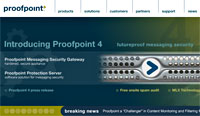 With companies becoming more concerned about internal security breaches rather than external threats, 34 per cent of companies claimed that their business was impacted by the exposure of sensitive or embarrassing information over the last year.
With companies becoming more concerned about internal security breaches rather than external threats, 34 per cent of companies claimed that their business was impacted by the exposure of sensitive or embarrassing information over the last year.
With all this secret email snooping going on, bosses have been delivering “You’re Fired!” messages with gusto, with more than one in three sacking an employee for violating email policies in the past 12 months.
There’s also been lots of finger wagging going off in the boss’s office, with over 70 per cent of UK companies disciplining an employee for violating email policies in the last year,
The report goes on to sat that just over a fifth of UK companies have given employees a shoutdown for violating blog or message board policies in the past 12 months, with 3.6 per cent getting the boot for their troubles.
Fear the email
Nearly half of UK companies declared themselves to be concerned about Web-based email being used to send confidential or proprietary information, with 81.3 per cent saying that it is “important” to reduce the legal and financial risks associated with outbound email in the next 12 months.
Of course, it’s worth noting that the folks who commissioned the survey – Proofpoint – just happen to run a business offering secure/filtered messaging systems, so it might be an idea to seek out the saltcellar when reading their report.
Email-free workzones
Looking to the future, Graham Titterington, principal analyst at Ovum, sees the automated blocking of outbound mail as the future security choice for most companies, as it would sidestep the current grey area concerning the legality of monitoring personal emails.
Quite how they’d the deal with terminally bored employees deprived of a lifeline to the real world may be another matter though.
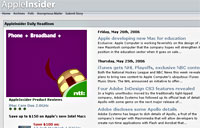 Apple’s attempt to identify the sources of leaked product information that appeared on Mac enthusiast websites has fallen flat on its face after a Californian court ruled that on-line reporters and bloggers are entitled to the same protections as traditional journalists.
Apple’s attempt to identify the sources of leaked product information that appeared on Mac enthusiast websites has fallen flat on its face after a Californian court ruled that on-line reporters and bloggers are entitled to the same protections as traditional journalists.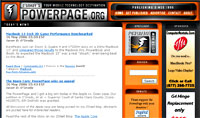 The court was having none of it, with a unanimous ruling giving the three online publications protection under the shield law, as well as the constitutional privilege against disclosure of confidential sources.
The court was having none of it, with a unanimous ruling giving the three online publications protection under the shield law, as well as the constitutional privilege against disclosure of confidential sources.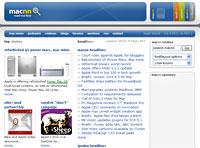 “The shield law is intended to protect the gathering and dissemination of news, and that is what petitioners did here,” added Justice Rushing.
“The shield law is intended to protect the gathering and dissemination of news, and that is what petitioners did here,” added Justice Rushing. The frequencies 1781.7-1785MHz paired with 1876.7-1880MHz known as the GSM Guard bands have been made available to 12 licensees under the Wireless Telegraphy Act. They are national UK licenses, though the operators of the licenses will have to cooperate amongst themselves so that interference between themselves doesn’t occur. Ofcom expect the licensees to form an industry body that will self-regulate. Operators will also be required to register all radio equipment in the “Sitefinder” database (currently populated by the GSM and 3G operators).
The frequencies 1781.7-1785MHz paired with 1876.7-1880MHz known as the GSM Guard bands have been made available to 12 licensees under the Wireless Telegraphy Act. They are national UK licenses, though the operators of the licenses will have to cooperate amongst themselves so that interference between themselves doesn’t occur. Ofcom expect the licensees to form an industry body that will self-regulate. Operators will also be required to register all radio equipment in the “Sitefinder” database (currently populated by the GSM and 3G operators). Winning Licensees
Winning Licensees New entrants could enter into roaming agreements with the current operators, but unless Ofcom mandates this (which is unlikely) there’s likely to be strong opposition. Since some of the license winners already have GSM networks, they can offer localised services knowing there’s no interference problems with existing infrastructure.
New entrants could enter into roaming agreements with the current operators, but unless Ofcom mandates this (which is unlikely) there’s likely to be strong opposition. Since some of the license winners already have GSM networks, they can offer localised services knowing there’s no interference problems with existing infrastructure. EFF-fans and electronic freedom groupies have a new poster boy who comes from an unlikely profession. They’re normally attracted to open-source code-a-holics, or white hat hacker, but this one’s a judge.
EFF-fans and electronic freedom groupies have a new poster boy who comes from an unlikely profession. They’re normally attracted to open-source code-a-holics, or white hat hacker, but this one’s a judge.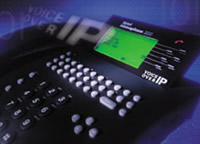 The ride wasn’t so rough from the other two judges, with the second, David Sentelle, appearing to side with the FCC, especially for Internet phone services. The last, Janice Brown kept her thoughts to herself.
The ride wasn’t so rough from the other two judges, with the second, David Sentelle, appearing to side with the FCC, especially for Internet phone services. The last, Janice Brown kept her thoughts to herself. As is now part of computer-lore, Apple Computers were called so because of the founders loves of the Beatles and their record label, Apple Corps.
As is now part of computer-lore, Apple Computers were called so because of the founders loves of the Beatles and their record label, Apple Corps. Latterly Apple Corps, with some justification, felt that Apple Computers had now entered the music business, through their iPod players and iTunes music store, so they brought legal action again.
Latterly Apple Corps, with some justification, felt that Apple Computers had now entered the music business, through their iPod players and iTunes music store, so they brought legal action again.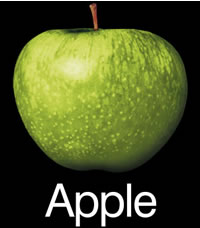 What drove the legal action?
What drove the legal action? New figures from the International Federation of the Phonographic Industry (IFPI) reveal soaring global sales of digital music while overall music sales continue to decline. This in the same week that Gnarls Barkley and their musical ditty Crazy have become the first digital-only Number One in the UK Hit-parade, as we’d
New figures from the International Federation of the Phonographic Industry (IFPI) reveal soaring global sales of digital music while overall music sales continue to decline. This in the same week that Gnarls Barkley and their musical ditty Crazy have become the first digital-only Number One in the UK Hit-parade, as we’d  The growing single song download market (which accounted for 86 percent of purchases), has resulted in many listeners choosing to grab individual tracks rather than download entire albums.
The growing single song download market (which accounted for 86 percent of purchases), has resulted in many listeners choosing to grab individual tracks rather than download entire albums.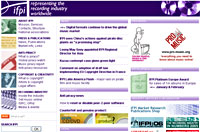 The biggest selling album of the year was “X&Y” by Coldplay, which could be heard being played – not too loudly, mind – in 8 million bedrooms, company cars and comfy living rooms.
The biggest selling album of the year was “X&Y” by Coldplay, which could be heard being played – not too loudly, mind – in 8 million bedrooms, company cars and comfy living rooms. Global revenue from music downloaded onto mobile phones went through the roof last year, with pundits predicting that the only way is up for the next five years.
Global revenue from music downloaded onto mobile phones went through the roof last year, with pundits predicting that the only way is up for the next five years.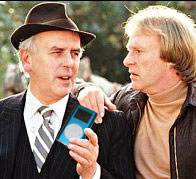 How to make a mint from mobile music
How to make a mint from mobile music When you actually talk to John Bunt, it’s me-groups-legal-pitfalls-with-postingshard to imagine him getting so angry about a Usenet group flame session, as to take the other parties to court. But he did. He also took their ISPs to court for carrying their libels.
When you actually talk to John Bunt, it’s me-groups-legal-pitfalls-with-postingshard to imagine him getting so angry about a Usenet group flame session, as to take the other parties to court. But he did. He also took their ISPs to court for carrying their libels. That dates back to a Noble Lord of the 19th century, who won a libel action against a book, causing the publisher to be convicted. Some years later, he found a second hand copy of that book in a second hand book shop, and sued them – and won. This meant that people sued WH Smiths – not because they disliked the bookseller, but because Private Eye was poor, and WH Smith had plenty of money.
That dates back to a Noble Lord of the 19th century, who won a libel action against a book, causing the publisher to be convicted. Some years later, he found a second hand copy of that book in a second hand book shop, and sued them – and won. This meant that people sued WH Smiths – not because they disliked the bookseller, but because Private Eye was poor, and WH Smith had plenty of money. This sort of case seems to be on the increase. “Anyone with web access and a quick temper can find themselves facing a lawsuit,” commented
This sort of case seems to be on the increase. “Anyone with web access and a quick temper can find themselves facing a lawsuit,” commented 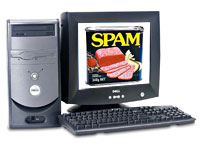 So, it’s Monday morning, you’ve sat down at your desk, powered up your PC and then slunk lower and lower in your chair as a fresh tide of spam rolls into your inbox.
So, it’s Monday morning, you’ve sat down at your desk, powered up your PC and then slunk lower and lower in your chair as a fresh tide of spam rolls into your inbox.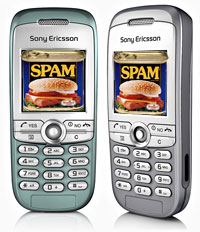 If musing over updated spam graphs are your thing, check out the
If musing over updated spam graphs are your thing, check out the  Major UK consumer broadband providers NTL are teaming up with BitTorrent, the developers of the world’s most popular peer-to-peer (P2P) application.
Major UK consumer broadband providers NTL are teaming up with BitTorrent, the developers of the world’s most popular peer-to-peer (P2P) application.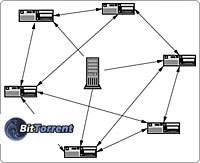 Naturally, rights holders and movie heavyweights weren’t too chuffed to see their content whizzing around the Internet for gratis, and quickly hired in squadrons of lawyers to apply pressure on BitTorrent.
Naturally, rights holders and movie heavyweights weren’t too chuffed to see their content whizzing around the Internet for gratis, and quickly hired in squadrons of lawyers to apply pressure on BitTorrent.